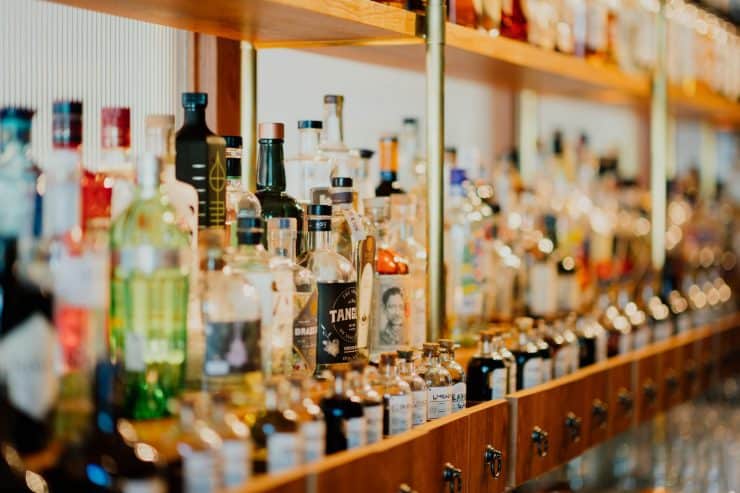The Physician Philosopher Podcast
TPP #8: Take the Edge Off Without Alcohol
If you’ve ever wanted to drink less or stopped drinking alcohol altogether, or have found it challenging to stop, this episode is for you.
Today’s thought is this, getting rid of buffers like alcohol requires doing hard thought work, creating new habits and making intentional plans, but you can do it because you can do hard things.
My Problem With Alcohol
So pandemic rolls around in about March. I’m at a conference in Vegas. I get quarantined for 14 days when I get back by my employer, because of being exposed to several people that were positive at that dinner, the dinner, the last night that I was there.
What did I do? I was down in my basement. I was by myself, so every day, about three o’clock, I started making an old fashioned, maybe have a beer. It started out pretty innocent. Then the quarantine ended and I got to go upstairs and experience what my wife had been experiencing for the last 14 days while I was in the basement.
Talk about three kids, school, homeschooling. I had an old fashioned plus two or three beers most days. I wasn’t working at this point, I had lots of off time. I didn’t really have a reason not to be drinking.
I started drinking pretty much daily, and it turned into a problem.
It got to a point where I didn’t really want to be drinking that much. I never would really have classified myself as an alcoholic. But I was drinking more than I wanted to. I had to start doing some tough thought work to try to figure out what is the impetus behind this?
Why Was I Doing It?
I started filling out a thought model. CTFAR. That’s the thought model that we use in coaching clients, and that is Circumstance, Thoughts, Feelings, Actions, and Results.
Well, the circumstance was this, there was a pandemic and I was a husband, a dad, a doctor, a business owner, and that was my circumstance. Those are all verifiable facts.
The thought that I was having about all that is that, I have so much to do and I have to deal with these two kids getting homeschooled, and a threenager yelling at me while I’m trying to do that at home.
That all produced a feeling of major anxiety. I started having palpitations in my chest. I would often get bored by being stuck in the house. That was another thought, different thought model, but a major anxiety, that’s the feeling.
I start making an old fashioned about three o’clock every day, and follow that up with a couple of beers, two or three beers. That was the action.
The result is I’d have even more to do because I didn’t do anything, I was drinking, and it was an action. I wasn’t getting stuff done, and I also wasn’t being a good dad. I slept worse. I was cranky the next morning and I didn’t show up as the kind of dad that I want to be.
My result was unacceptable. My feeling was anxiety, which drives everything, right? You as a human, you either are seeking pleasure trying to avoid pain. It’s not the situation I wanted. I wanted to drink in a controlled fashion.
How I Made the Change
Here’s my new intentional model, the one I was moving towards after getting some coaching.
So the circumstance, usually doesn’t change.
Now my new thought was this. I am replaceable at work, but I am not replaceable at home. I get to be a dad to three kids who love me and work can wait. I get to be a dad of three kids who love me.
So what did that produce in terms of feelings? Now, I’m content, I’m confident, I’m comfortable.
And actions that produces were intentionally planning my alcohol consumption.
The result ultimately showing up as the kind of dad that I wanted to be. Which is a dad that doesn’t over-drink, that doesn’t wake up cranky, that doesn’t set a bad example for his children. Reshaping my thoughts is what ultimately led to my change.
You might remember there in that thought model was intentionally planning my alcohol consumption. So what does that mean?
How to Find the Solution For You
The hard thought work here is, you have to figure out what the trigger is. For me, it was anxiety and boredom. For you, it might be stress at work. You have to sit down and talk with somebody to get your thoughts out and figure out what the trigger is.
Then we need to break the cycle. What we do here is, oftentimes when people have these emotions that they don’t want, they feel like there’s only two options, right? They’ll feel like they can accept the emotion. Or they can resist it and try to fight it, which is actually usually worse.
But there really is a third option where you get to just meditate and sit in the room. Describe your feeling, like I’m anxious. My chest is tight. My breathing’s fast. However you want to describe it. Just think about the feeling that’s there and you just allow it.
The idea is that you can allow fear and anxiety to be in your life and act in spite of it. In other words, you’re not resisting it and you’re not accepting it, you’re just allowing its presence and saying, I’m going to do this anyway.
You can allow that urge and know that it’s there and still not drink alcohol. In fact, that is what we have to do in order to break the cycle. If you break the cycle enough times, your brain will not expect that quick fix solution to your anxiety. You’ll get used to just being anxious and choosing not to drink.
The Importance of Being Intentional
As soon as you make it intentional and you start meditating on it, you close your eyes, and you think about your anxiety. Oftentimes it’ll help relieve it because you’re focusing on it. We’re breaking down system one, by being intentional about thinking about it.
Think about that trigger, then learn to allow the urge. Be courageous in the spite of fear and let the fear be there, let the anxiety be there, let the stress be there.
The thought model above I mentioned, the action was intentionally planning my alcohol consumption. I have limits on things. 24 hours in advance was the requirement that I made to choose what I was going to drink, how much I was going to drink, where and when I was going to drink it and why. I made all those decisions ahead of time.
I started out by making very intentional planning and very intentional rules to help limit my alcohol consumption. I can just have a couple beers, because I don’t need them to buffer my anxiety or my boredom anymore. I’ve learned how to deal with those things without alcohol.
Ultimately your goal is building habits. After you find some success with this, it becomes easier, and easier, and easier to keep your new habits until it’s really a part of you and your identity. There is a way to allow emotions that are negative in your life and to act in spite of them, to allow them without resisting them, or accepting them, we know that’s true.
Final Thoughts
That’s the thought for today. Getting rid of buffers, do hard thought work, creating new habits and making intentional plans. But you can do it because you can do hard things.
While we ride out this episode, don’t forget that the wait list for the Fall Alpha Group Coaching Experience is now open. You can find out more information about joining that wait list, which doesn’t require any financial decisions on your part. If you’re interested visit thephysicianphilosopher.com/alpha-waitlist.The wait list closes on 10-24, and that’s when Alpha Group Coaching will go on sale.
TPP
4 Comments
Submit a Comment
You might also be interested in…
The Arrival Fallacy
We all have ideas of what happiness looks like. We say things like, “when ___ happens, I’ll be happy.“ This is called the Arrival Fallacy. Today we’re going to talk about to find true happiness.
5 Steps to Lose Weight with Dr. Ali Novitsky
Have you ever wanted to lose weight (or get a six-pack) but it always felt too hard to get it done?
As a life coach for women physicians, Dr. Ali Novitsky shares her insight and expertise to show us how to achieve optimal health with simple strategies backed by science.
Creating Healthy Boundaries with Technology
Business culture indoctrination often means we find ourselves believing we need to hustle 24/7 to get results, but it doesn’t have to be that way.What’s really important about today’s episode is understanding how we can use technology not to worsen our constant availability – which can lead to burnout – but instead how to use that technology to set boundaries.
Are you ready to live a life you love?
© 2021 The Physician Philosopher | Website by The Good Alliance





Almost 3 weeks into our 3rd Sober October in 3 years. It’s going well, but I’ll admit I’m looking forward to All Saint’s Day!
I brewed beer for the first time in 18 months a couple of weeks ago, and my rhubarb Sour Patch wheat will be ready come November. I’ve got a hard cider going, as well.
Like you, I’ve done better with alcohol by making decisions ahead of time, making rules, and tracking my intake with some level of precision. I’m always a work in progress.
Cheers!
-PoF
Sober months! Strong work, brother. I am definitely on a sober call week!
P.s. I have thought about getting back into brewing too. It’s been more like 7 years for me, though!
May I paraphrase your intentional drinking statements and share them with patients? I think this is a great idea and could also be applied to other behaviors like eating and dating behavior. And spending. Reflecting back, the concept may not be new but this is another way of looking at it.
Absolutely. Here to help people!